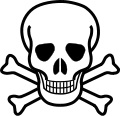Poison Treatment
Sometimes, in spite of all precautions, poisonings happen. When they do occur, immediate medical attention becomes critical. While emergency room physicians are certainly well versed in the treatment of poisonings, sometimes all the information and treatment that's necessary is just a phone call away—through one of the nation's 60 poison centers.
When a victim is unconscious, having seizures, or experiencing difficulty breathing, call 9-1-1 immediately. Otherwise, if the poisoning involves a medication, contact Poison Control as soon as possible at (800) 222-1222 (they're available 24 hours a day, 7 days a week).
Be prepared to answer the following questions if possible:
- What is the condition of the individual who was exposed?
- What is their age and how much do they weigh?
- What is the name of the medication and approximately how much was ingested?
- When did the exposure occur?
Unless you are instructed to do so, do not administer anything by mouth. Poison Control can provide you with immediate recommendations for treatment.
If the poison exposure involves a household product or chemical, first administer emergency first aid treatment and then call Poison Control. If more than one adult is available to help, one should call Poison Control while the other provides first aid.
- If a poison comes in contact with the skin, remove any contaminated clothing and then rinse the skin with water continuously for 15 minutes.
- If the eye is involved, rinse the eye with lukewarm water immediately and continue for 15 minutes. Rather than forcing the eye open to rinse it, encourage the person to blink as much as possible.
- When a household product or chemical is ingested, give a glass of water (2 to 8 ounces) to drink. Do not try to make the person throw up unless instructed to do so by Poison Control. In some cases, vomiting can actually cause additional damage.
- When poisonous gases or fumes are the source of the problem, quickly remove the person from the contaminated area and into fresh air as soon as possible. If the gas or fumes present an immediate threat to you, do not attempt to rescue the individual; call 9-1-1.





